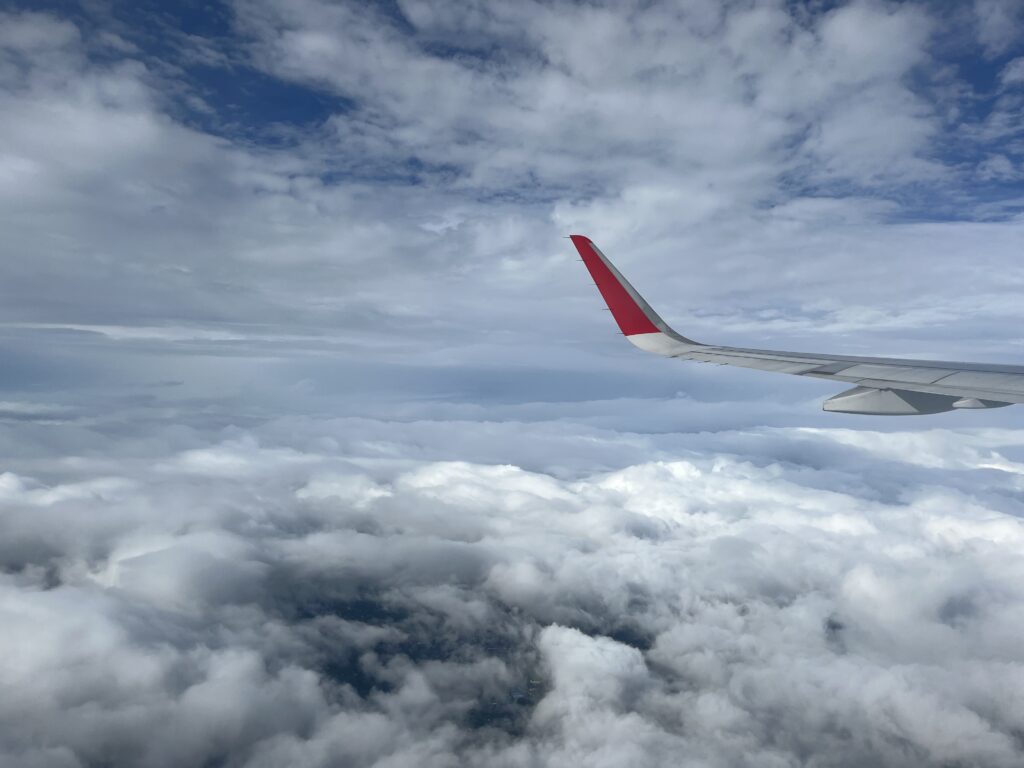
It was 11:40 at night, and after canceling and rebooking several cabs, I finally reached the airport, fifteen kilometers from my flat. Indian airports these days feel no less crowded than railway stations—proof, perhaps, of the country’s growth. But who cares about economics when your bladder is at war?
I hurried through security, just in time to get a call from the airline: the flight was delayed an hour. “Thank god,” I thought. “Now I can go to the washroom.”
Inside, the toilets were clean, brightly lit, and full—two Indian, two Western, all occupied. I dropped my handbag on the platform behind the door and checked the mirror. That’s when she appeared. A woman, as if conjured out of nowhere, stood at the far basin. She opened a jar of charcoal mask, mixed it with water, and began smoothing it across her face. Air hostess? Airport staff? Or just someone who packed better than I did? I wondered. At last, a stall freed up, and I surrendered to long-awaited relief.
The departure lounge was crowded, noisy, and sticky with anticipation—children crying, couples bickering or reconciling, first-time flyers clutching boarding passes like talismans. I claimed an empty seat with rusted edges and mysterious red stains—hopefully ketchup.
I pulled out Gulliver’s Travels, but a voice nearby was louder than Swift. “Yeah, yeah, I’m going to Delhi, don’t care about the time, yaar…”
It was her again—the charcoal-mask girl. This time I saw her properly: average height, dusky skin, lips unevenly painted with a fierce red. The glowstick-like gleam of her face proved the mask was doing its job, and I suddenly wanted to know the brand.
She kept talking, and I kept pretending to read, though I wasn’t the only one watching. A young man across from me—tall, well-groomed, diamond studs flashing—had been eyeing her with the intensity of a Netflix rom-com hero. Eventually, he stood, bag in hand, and circled to the row behind me, “coincidentally” landing in the empty seat beside her.
She was still on the phone, unimpressed. He waited, composed, like a hunter who had rehearsed patience. When she finally hung up, he pounced.
“Hey, I heard you talking about the share market. Rare for a woman. I’m impressed. I’m Prakhar.”
She smiled faintly, no words.
“Which flight? Bangalore?”
“Delhi. Air India. You?”
“Same,” he said, voice practiced and steady.
From behind them, I couldn’t see expressions, but I could imagine hers: amused, assessing. She teased, “You look like a banker.”
He laughed. “No, IT consultant.”
And just like that, their conversation found its rhythm—half-flirtation, half-interview—until the boarding announcement cut them off. She slipped away with her bag in hand, leaving him blinking after her. Seconds later, he hurried to rejoin her in line, tapping her shoulder:
“You didn’t even say goodbye.”
She turned, smiling. “Sorry. What’s your seat number?”
“6A. You?”
“6F. Not that far, then. Maybe that’s why I forgot to say bye.”
They both laughed, and the boarding line swallowed them whole.
Inside the plane, I slid my handbag into the overhead compartment and took my seat, 6 B. I was hoping for quiet—belt fastened, book open, world tuned out. But fate, as always, had other plans.
The tall young man appeared, boarding pass in hand: Prakhar. He paused at our row. The passenger in 6C and I started to rise to let him squeeze in, but he waved us down and walked straight to the girl. A quick negotiation followed, and the man seated beside her—a polite, nervous traveler—agreed to swap. He shuffled over, offering me the window seat with an apologetic smile. Who was I to refuse? I slid gratefully into the seat.
Prakhar, meanwhile, was triumphant: now shoulder-to-shoulder with the charcoal-mask girl. Conversation sparked again—small jokes from him, lavish laughter from her. Photos followed, of course.
By 1:30 a.m., her energy ebbed. She leaned back, half-closing her eyes. His shoulder hovered, eager, waiting. But instead of surrendering to his gallantry, she reached into her bag and produced… another mask. With clinical precision, she pressed it to her face and reclined, glowing faintly in the dim cabin light.
Prakhar froze, denied even the comfort of chatter. The quiet man, who had sacrificed his seat, watched her serenely. And me? From my new window perch, I finally knew the brand. Everyone on that flight, it seemed, was expectant—some for love, some for relief, some just for arrival.
